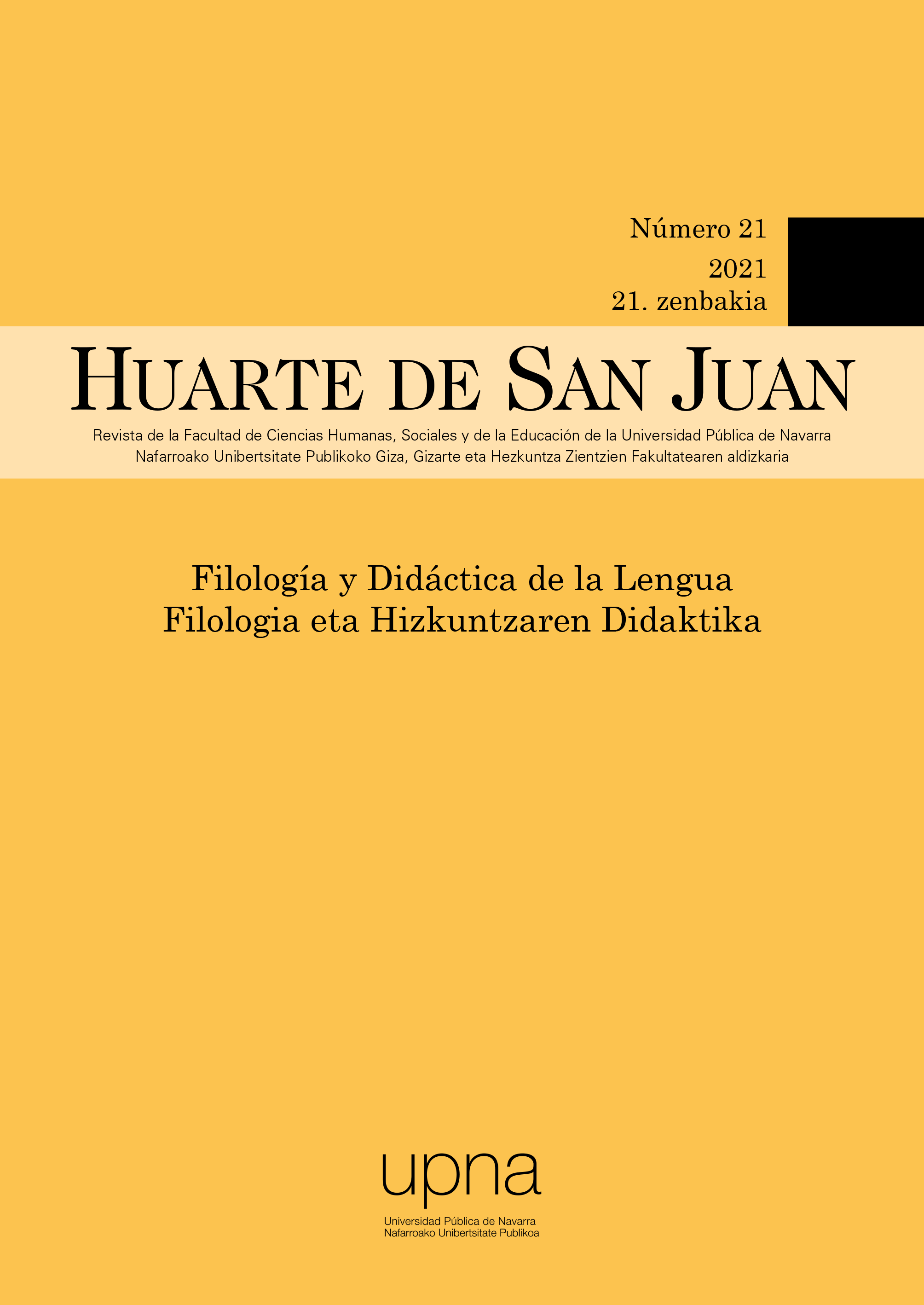Lectura eficiente de un texto literario narrativo a partir de la metacognición en español como lengua no materna
DOI:
https://doi.org/10.48035/rhsj-fd.21.8Keywords:
Metacognición; estrategias; textos literarios narrativos; compresión lectora; español como lengua extranjeraAbstract
Reading comprehension assessment for students is not limited to the question-and-answer strategies. In order to achieve an effective reading comprehension (RC) it is paramount to activate the conscious awareness and learning control strategies. In this context, literary texts are not only a source of linguistic and cultural knowledge, but they are also an optimal framework for communicative situation representation. This study focuses on the RC development in literary texts using metacognitive strategies for the Spanish as a foreign language (ELE) classroom. Our aim is to present the findings of a research carried out with C1 level university students and showcase its connection with the results of a previously conducted research with B2 level students in the same context. The used methodology entails a classroom-based research, both applied and descriptive, completed through a simple qualitative and quantitative data analysis.
Downloads
References
Albaladejo García, M. D. (2007). Cómo llevar la literatura al aula de ELE: de la teoría a la práctica. MarcoELE, Revista de didáctica ELE, 5, 1-51. https://marcoele.com/como-llevar-la-literatura-al-aula-de-ele-de-la-teoria-a-la-practica
Aragón de Moreno, A. (2014). La metacognición como herramienta en la lectura de textos universitarios. Acción pedagógica, 23, 38-46.
Aznar Juan, M. L., y Gamazo Carretero, E. (2019). Estrategias metacognitivas de comprensión lectora en textos literarios. En M. López Pérez, y G. Maya Retamar (Eds.). Lectura y educación literaria (1.ª ed., pp. 15-27). Diputación de Badajoz. http://dx.doi.org/10.14195/978-989-26-1231-7
Baker, l., y Brown, A.L. (1984). Metacognitive skills and reading. En D.Pearson (Ed.), Handbook of reading research (1.ª ed., pp. 357-394). Longman.
Binkley, M., Rust, K., y Williams, T. (Eds.). (1997). Reading literacy in an international perspective. (1.ª ed.). US Department of Education.
Brown, A.L., Palincsar, A.S., y Armbruster, B.B. (2006). Instruction comprehension-fostering activities in interactive learning situation. En R. B. Ruddell y N. J. Unrau (Eds.). Theoretical Models and Pro-cesses of Reading (5.ª ed., pp. 780-809). International Reading Association.
Calero, A. (2012). El lector como reparador de significado. Un ejemplo práctico de instrucción directa en estrategias metacognitivas. Didáctica. Lengua y Literatura, 25, 83-115. http://dx.doi.org/10.5209/rev_DIDA.2013.v25.42237
Cerchiaro Ceballos, E., Paba Barbosa, C., y Sánchez Castellón, L. (2011). Metacognición y comprensión lectora: una relación posible e intencional. Duazary, 8(1), 99-111. https://doi.org/10.21676/2389783X.258
Colomer, T., Manresa, M., Ramada Prieto, L., y Reyes López, L. (2018). Narrativas literarias en educación infantil y primaria. (1.ª ed.). Síntesis.
Consejo de Europa (2002). El Marco común europeo de referencia para las lenguas: aprendizaje, enseñanza, evaluación. (1.ª ed.). Anaya y CVC.
Delmastro, A. L. (2010). El andamiaje metacognitivo en contextos de aprendizaje de una lengua extranjera. Didáctica. Lengua y Literatura, 22, 93-124.
Flavell, J. H. (1997). El desarrollo cognitivo (2.ª ed.). Prentice Hall.
González Fernández, A. (1992). Estrategias metacognitivas en la lectura (1.ª ed.). Editorial de la Universidad Complutense de Madrid.
Gutiérrez-Braojos, C., y Salmerón Pérez, H. (2012). Estrategias de comprensión lectora: enseñanza y evaluación en educación primaria. Profesorado. Revista de currículum y formación del profesorado, 16(1), 183-202. http://www.ugr.es/~recfpro/rev161ART11.pdf
Heit, I. (2012). Estrategias metacognitivas de comprensión lectora y eficacia en la asignatura de Lengua y Literatura. Revista de Psicología, 8(15), 79-96. https://repositorio.uca.edu.ar/handle/123456789/6016
Irrazábal, N., y Sáux, G. (2005). Comprensión de textos expositivos. Memoria y estrategias lectoras. Educación, Lenguaje y Sociedad, I(3), 33-55.
Jiménez Pérez, E. (Eds.). (2015). La comprensión y la competencia lectoras. (1.ª ed.). Síntesis.
Llopis, R. (2008). La comprensión lectora, ¡esa gran incomprendida! Foro de profesores de E/LE, 4, 1-9. https://doi.org/10.7203/foroele.0.6545
López Delgado M. (2005). Estrategias de comprensión (1.ª ed.). Ediciones de la UCLM.
López González, A. (2020). Proyectos de lectura de obras literarias para alumnos de español como lengua extranjera. Tonos Digital; 38, 1-24. http://www.tonosdigital.es/ojs/index.php/tonos/article/view/2389/1109
López Jiménez, G., y Arciniegas Lagos, E. (2004). Metacognición, lectura y construcción de conocimiento. El papel de los sujetos en el aprendizaje significativo. (1.ª ed.). Cátedra UNESCO para la lectura y la escritura en América Latina.
Moreno Fernández, F. (1990). Metodología sociolingüística. (1.ª ed.). Gredos.
Moreno, C. (2011). Materiales, estrategias y recursos para la enseñanza del español como L2. (1.ª ed.). Arco/libros.
Nikolajeva, M. (2014). Reading for learning: Cognitive approaches to children’s literature. (Vol. 3) (1.ª ed.). John Benjamins Publishing Company.
Nunan, D. (1996). Learner strategy training in the classroom: An action research study. TESOL Journal, 6, 35-41.
OCDE (2017). Marco de Evaluación y de Análisis de PISA para el Desarrollo: lectura, matemáticas y ciencias, Versión preliminar. OECD Publishing. https://www.oecd.org/pisa/aboutpisa/ebook%20-%20PISA-D%20Framework_PRELIMINARY%20version_SPANISH.pdf
Perfetti, C.A. (2007). Reading ability: Lexical quality to comprehension. Scientific Studies of Reading, 11, 357-383. https://doi.org/10.1080/10888430701530730
Puente, A. (1991). Teoría del esquema y comprensión de lectura. En A. Puente. (Ed.). Comprensión de la lectura y acción docente (1.ª ed., pp. 73-109). Pirámide.
Puente, A., Mendoza-Lira, M., Calderón J. F., y Zúñiga, C. (2019). Estrategias metacognitivas lectoras para construir el significado y la representación de los textos escritos. Ocnos, 18(1), 21-30. https://doi.org/10.18239/ocnos_2019.18.1.1781
Ramírez Peña, P., Rossel Ramírez, K., y Nazar Carter, G. (2015). Comprensión lectora y metacognición: Análisis de las actividades de lectura en dos textos de estudio de la asignatura de Lenguaje y Comunicación de séptimo año básico. Estudios Pedagógicos, XLI(2), 213-231. http://dx.doi.org/10.4067/S0718-07052015000200013
Richards, J. C., y Lockart, Ch. (1998). Estrategias de reflexión sobre la enseñanza de idiomas. (1.ª ed.). Cambridge University Press.
Richards, J., Platt, J., y Platt, H. (1997). Diccionario de lingüística aplicada y enseñanza de lenguas. (1.ª ed.). Ariel.
Richter, T., y Rapp, D.N. (2014). Comprehension and validation of text information: Introduction to the special issue. Discourse Processes, 51, 1-6. https://doi.org/10.1080/0163853X.2013.855533
Romero, M.F., Trigo, E., y Moreno, P. (2018). De la comprensión lectora a la competencia literaria a través de la obra de Eliacer Cansino. Ocnos, 17(3), 68-85. https://doi.org/10.18239/ocnos_2018.17.3.1776
Sandoval Zúñiga, M. S., Gómez Álvarez, L., y Sáez Carrillo, K. (2010). Estrategias metacognitivas en la comprensión auditiva del inglés como segunda lengua. Lenguas Modernas, 36, 25-44. https://lenguasmodernas.uchile.cl/index.php/LM/article/view/30679/32435
Solé, I. (1998). Estrategias de lectura. La enseñanza de estrategias de comprensión lectora. (8.ª ed.). Graó.
Vidal-Abarca, E., Maña, A., y Gil, L. (2010). Individual differences for self-regulating task-oriented reading activities. Journal of Educational Psychology, 102(4), 817-826. https://doi.org/10.1037/a0020062
Winograd, P. N., y Hare, V. C. (1988). Direct instruction of reading Comprehension strategies: The role of teacher explanation. En E. Goetz, P. Alexander y C. Weinstein. (Eds.). Learning and study strategies: Issues in assessment, instruction and evaluation (1.ª ed., pp. 129-139). Academic Press. https://doi.org/10.1016/B978-0-12-742460-6.50014-1
Zunshine, L. (Ed.). (2015). The Oxford handbook of cognitive literary studies. (1.ª ed.). Oxford University Press. https://doi.org/10.1093/oxfordhb/9780199978069.001.0001
Zwaan, R. A., y Singer, M. (2003). Text Comprehension. En A. Graesser, M. A. Gernsbacher y S. R. Goldman (Eds.), Handbook of Discourse Processes (1.ª ed., pp. 83-121). Lawrence Erlbaum. https://www.routledgehandbooks.com/doi/10.4324/9781410607348.ch3

Downloads
Published
How to Cite
Issue
Section
License
Copyright (c) 2022 María Luisa Aznar Juan, Elena Gamazo Carretero

This work is licensed under a Creative Commons Attribution-NonCommercial-NoDerivatives 4.0 International License.
All articles are published under a Creative Commons (BY-NC-ND 4.0) license. Each article will be assigned a DOI.
Authors retain copyright of their work and grant the journal the right to the first publication. Authors can sign additional agreements to non-exclusive distribution of the published version of the article (for example, in an institutional repository) as long as appropriate attribution to the original publication is provided. Articles can be uploaded to institutional repositories immediately after publication.
Electronic distribution of the articles (for example, academic social networks or personal webpages) is allowed and encouraged.
The journal reserves the right to publicise the work in social networks and other electronic means.






